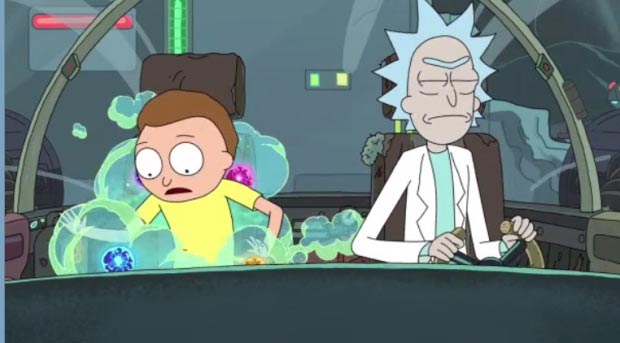A few years ago, I distinctly remember seeing commercials for a cartoon called “Rick and Morty” in its second season. I scoffed at these ads for what seemed like another stupid adult cartoon full of cheap jokes and lazy writing, as I waited for the Colbert Report to return. I promptly forgot about this show and never intended to think of it again. It wasn’t until two full years later that one of my close friends started raving about this show to me. He told me that my judgements based on the advertisements were wrong, and made me watch the first few episodes with him and another friend. Within a few hours, I had purchased a subscription to Hulu so that I could stream Rick and Morty, because I was hooked.
This show, created by Dan Harmon and Justin Roiland, uses an interesting drawing style which is inspired somewhat by older cartoons such as The Simpsons or Futurama, but certainly with its own unique style and characteristic bright color palette. It is full of colors made to pop out at the viewer.

What also popped out to me about this show was its clever storytelling, use of both subtle and unsubtle jokes, and its tendency to subvert its narrative and force viewers to ponder philosophical questions such as the “self”, existence of good & evil, and mankind’s place in the universe. My favorite example of this is Season 2 Episode 2, “Mortynight Run”.
The main plot for this episode follows the titular characters through an adventure to raise an interesting philosophical question. Rick Sanchez, a nihilistic, self-righteous supergenius scientist/inventor with questionable morals, gets into a disagreement with his well-natured and kind if slightly dimwitted grandson, Morty when he sells a high-tech antimatter gun to an assassin. Morty reasons that selling a weapon to an assassin is akin to pulling the trigger oneself. Rick dismisses this notion, saying that “If [the assassin] wants someone dead, there’s nothing that anyone can do to stop him.” This prompts Morty to fly his grandfather’s spaceship to the target in order to prevent the murder. After Morty stops the assassin, he finds his target in a maximum security galactic prison outpost: a sentient cloud of gas capable of reading and influencing minds through an emotional song sung in the stylings of the late David Bowie.
The gas cloud (nicknamed “fart”) proves to be trouble, as law enforcement chases the duo and their new companion across the galaxy. In the process, fart causes massive catastrophes to allow them to escape. Morty’s adherence to saving Fart’s life results in the deaths of many more sentient beings. When Morty is ready to send Fart home through an interdimensional portal, Fart informs him that he will return with others of his kind, and that together, they will wipe out all carbon-based life which they see as a plague. Tearfully, Morty asks him to sing another song as he prepares to shoot Fart with the antimatter gun.
The question of ethics posed is whether or not it is worth it to allow one person to die if others may be in danger if they are saved, and is frequently described as the “Trolley Car Problem” in philosophy (Would you allow one person to be run over by a trolley if switching the tracks results in the trolley crushing another person (or people).
Here are a few questions from my interview with fellow student, Victoria Mcguire.
Q: What about Rick and Morty keeps you watching?
A: The humor. It’s funny, it’s witty, dry humor. I also like the style of art. It’s a cartoon, so [the creators] aren’t limited by human abilities on screen.
Q: How does the song “Goodbye Moonmen” make you feel?
A: It makes me feel good, but also kinda weird. It’s kinda out of place in the show, but but It also works so well at the same time. It makes me feel weird in a good way.
Q: Has this show ever made you consider deeper aspects of the human condition that you would otherwise have never thought about?
A: Yeah. One thing that really kinda got me was one of the episodes, their universe had an apocalypse, and Rick pulled up an alternate universe where Rick and Morty had just died, and they slipped into their dead alternate selves’ former lives. It really got me questioning how life works, and how you would handle it if you had to bury your own body in the backyard like they did, you know? It’s weird, and nobody has ever had to in real life, but it really makes you have to question yourself.
I re-encountered the first two seasons of Rick and Morty, and all I can say is that it really appeals to me still. The characters are written as well as the jokes, the visual art style still stands out to me as bright and interesting, and it still keeps me thinking about things beyond laughing at the humor while remaining funny enough to keep me engaged.
This show is without a doubt one of the most creative and influential works of art to affect me.
Comments